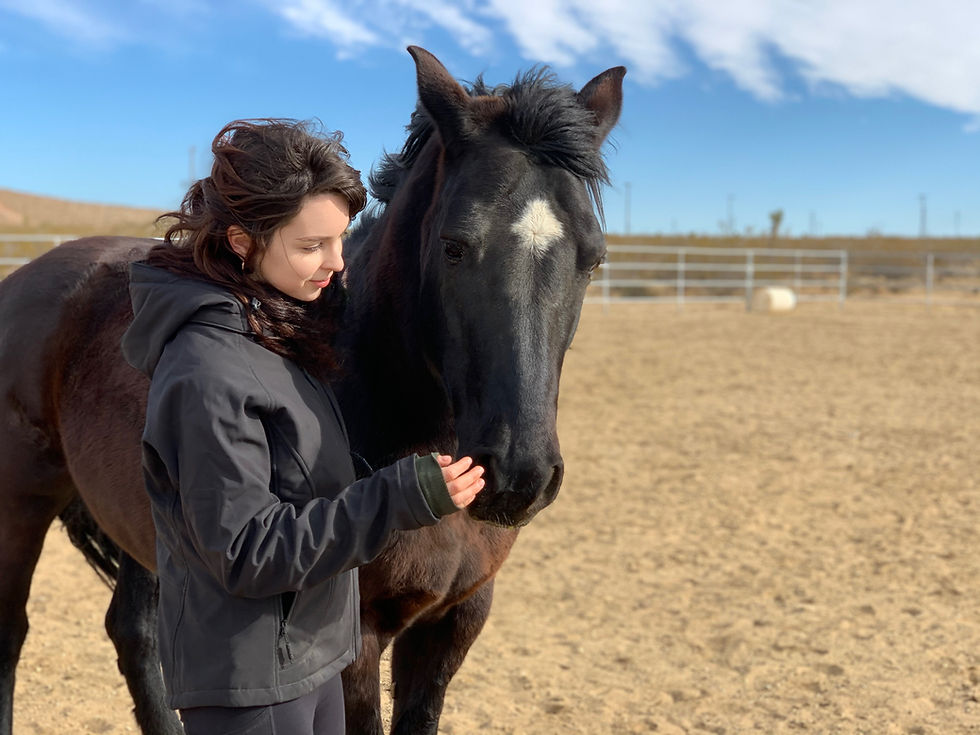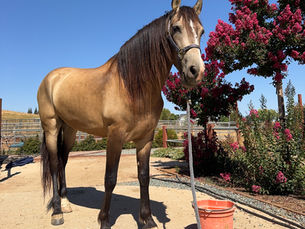Is Equine Veterinary Medicine Right For You?
- Horse Education Online

- May 27, 2025
- 5 min read
A Self-Assessment Quiz
Introduction
Pursuing a career as an equine veterinarian is both a calling and a commitment. It requires deep compassion for animals, a strong foundation in science, resilience in the face of physical and emotional challenges, and the ability to thrive in a demanding yet rewarding environment.
This self-assessment quiz is designed to help you reflect on whether this path aligns with your personality, skills, goals, and lifestyle. It’s not a test of your current knowledge—it’s a tool for honest introspection about what this career truly involves.
Take your time. Answer as honestly as possible. This is for you.
Instructions & Scoring
Each question offers four choices. Choose the one that best describes your thoughts or behavior. Use the following point system:
a = 4 points
b = 3 points
c = 2 points
d = 1 point
After completing all 15 questions, add up your total score and review the scoring interpretation at the end.
1. How do you feel about handling horses of all sizes and temperaments?
a) I’m confident and experienced with even difficult horses.
b) I’m learning but feel pretty comfortable.
c) I enjoy horses but prefer calmer ones.
d) I feel nervous or unsure around them.
2. How do you handle physical stress like long hours, lifting, and outdoor work?
a) I enjoy being active and outdoors, regardless of conditions.
b) I can adapt, even if it’s tiring.
c) I struggle with physically intense work.
d) I prefer work that’s physically easier or indoors.
3. How do you respond in emergency or high-pressure situations?
a) I stay calm, think clearly, and act fast.
b) I can focus but feel anxious.
c) I often panic or freeze.
d) I avoid high-stress situations if I can.
4. What are your feelings about treating injuries, blood, or euthanasia?
a) I can handle it professionally and empathetically.
b) I might struggle at first, but I’d adapt.
c) I’m very sensitive to this kind of work.
d) I would avoid those tasks if possible.
5. Are you prepared for 6–8 years of intense academic training, including science-heavy coursework?
a) Yes—science and learning excite me.
b) I’m willing, even though it’s a challenge.
c) I’m unsure—it seems overwhelming.
d) I’m not interested in that level of schooling.
6. How well do you work in teams with other professionals (vets, farriers, barn staff)?
a) I collaborate easily and enjoy it.
b) I work fine with guidance.
c) I prefer working solo.
d) I avoid group work when I can.
7. How do you feel about problem-solving under pressure (e.g., diagnosing a horse with vague symptoms)?
a) I love solving puzzles and thinking critically.
b) I can do it but prefer straightforward tasks.
c) I find it stressful and frustrating.
d) I avoid situations that require quick analysis.
8. Are you confident communicating complex medical information to clients?
a) Yes, I’m comfortable educating and explaining.
b) I can do it with preparation.
c) I sometimes struggle to simplify information.
d) I dislike explaining things in general.
a) I have a deep passion for helping horses.
b) I love animals and want a hands-on career.
c) It seems like a stable and respected field.
d) I’m still not sure—it just seems interesting.
10. How do you handle emotionally difficult cases, like telling an owner bad news?
a) I can deliver tough news with empathy and clarity.
b) I get emotional, but I manage.
c) I struggle to stay composed.
d) I would find that unbearable.
11. How do you approach learning new tools, treatments, and technologies?
a) I’m eager to learn and stay current.
b) I adapt when needed.
c) I resist change unless necessary.
d) I’m slow to adopt new methods.
12. Are you comfortable with unpredictability in your daily routine?
a) I enjoy variety and quick changes.
b) I can handle some unpredictability.
c) I prefer set schedules and routines.
d) I dislike anything unexpected.
13. How do you handle fatigue and emotional burnout?
a) I’ve built good coping skills and self-care habits.
b) I push through, though it’s hard.
c) I burn out easily.
d) I avoid high-demand roles to protect my health.
14. Do you understand the financial and time investment required to pursue this career?
a) Yes, and I’ve prepared or am preparing.
b) I understand and am researching options.
c) I didn’t realize how much it required.
d) It seems like too much for me.
15. Do you feel a sense of purpose or calling toward veterinary work with horses?
a) Absolutely—it’s what I’m meant to do.
b) Yes, I feel strongly about it.
c) I like the idea, but I’m not sure.
d) Not really.
16. When faced with failure or a major setback, how do you typically respond?
a) I reflect, adapt, and try again with a new strategy.
b) I take some time to recover but eventually regroup.
c) I tend to avoid similar situations in the future.
d) I feel defeated and struggle to move forward.
17. How do you approach time management and organization?
a) I’m highly organized and keep a consistent schedule.
b) I manage my time well under pressure.
c) I try, but I often procrastinate.
d) I struggle with deadlines and structure.
18. How do you react to constructive criticism?
a) I actively seek it and use it to improve.
b) I reflect on it, even if it stings.
c) I try to avoid situations where I’ll be criticized.
d) I take it personally and often feel discouraged.
19. How do you handle routine tasks or repetition over long periods?
a) I value consistency and perform well in routines.
b) I prefer variety, but I’ll follow through.
c) I get bored quickly and lose focus.
d) I avoid routine work if possible.
20. How curious are you about the why behind what you’re doing?
a) I constantly ask questions and explore topics deeply.
b) I enjoy learning new things but don’t always dive deep.
c) I do what’s needed but rarely go beyond.
d) I’m task-focused and don’t ask many questions.
21. How would others describe your empathy and compassion?
a) Deeply empathetic—I’m often the one people come to.
b) I’m caring and try to help others feel understood.
c) I care, but I keep emotional distance.
d) I struggle to relate to others’ emotions.
22. When working on a team, how do you usually contribute?
a) I lead, support, and mediate when needed.
b) I participate actively and listen well.
c) I go along with the group but rarely speak up.
d) I prefer to work alone and avoid team settings.
23. How do you deal with uncertainty or situations where there’s no clear answer?
a) I stay calm and use logic to navigate ambiguity.
b) I feel uneasy but work through it.
c) I get frustrated and doubt my abilities.
d) I avoid uncertain or complex situations.
24. What best describes your attention to detail?
a) I’m meticulous and double-check everything.
b) I’m generally accurate but may miss small things.
c) I prioritize speed over perfection.
d) I struggle to stay focused on fine details.
25. How do you balance personal life with demanding goals or responsibilities?
a) I have strong boundaries and time management.
b) I try, but sometimes sacrifice self-care.
c) I often overcommit and feel overwhelmed.
d) I struggle to maintain balance and often burn out.
Scoring Guidelines
The total possible score is 100 points.
85–100: Outstanding Fit – You demonstrate the mindset, resilience, and emotional maturity aligned with the veterinary profession.
70–84: Strong Potential – You’re well-suited for this career. Developing a few skills or habits could bring you even closer to readiness.
55–69: Emerging Readiness – You may have a passion for animals but might need to strengthen some personal or interpersonal traits before pursuing veterinary school.
Below 55: Explore Other Options – Consider shadowing a vet or exploring other animal-related careers. You might thrive in a different equine role better suited to your strengths.










Comments